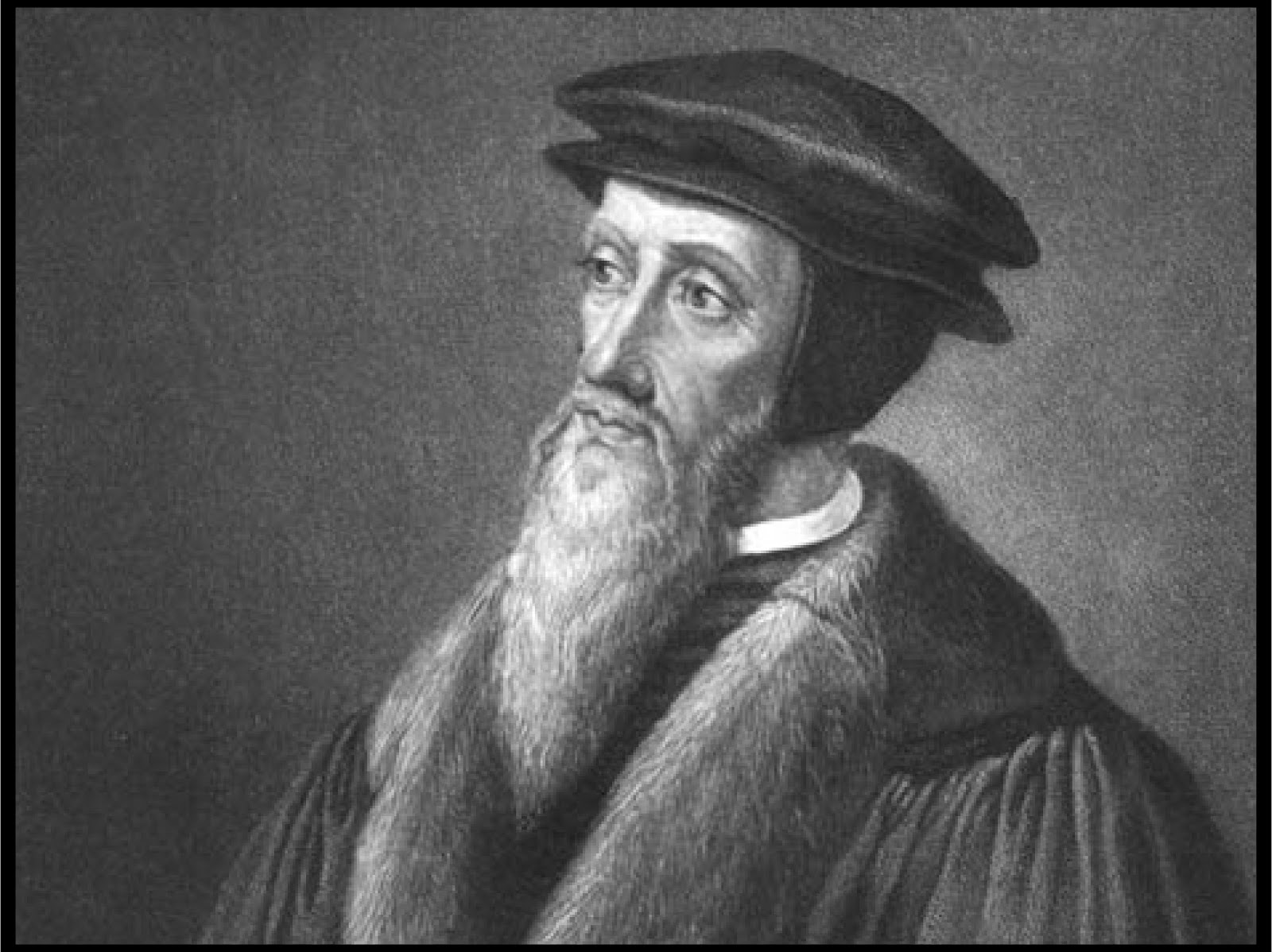John Calvin (1509-1564) was a serious player in the “reformation” – the break of what is now known as the Protestant Church from the Roman Church. He had very strong opinions on the way that the Sovereignty of God trumps any freedom that mankind might have… which might be none.
Often today one misnomer (my opinion) for Calvinism is “reformed theology”. Actually there are many more who would share the theology of the reformers, but not the same theology as Calvin or his students.
Calvin was a serious player, but the reformation was not build around him. It was built around mainly 5 (ironically, what is it with that number in theology?) theological statements… the 5 soli (or sola) statements that were meant to distinguish the reformers from the Roman Catholic Church to which they were contemporary:
Sola Scriptura (Scripture alone)
Solus Christus (Christ alone)
Sola Gratia (Grace alone)
Sola Fide (Faith alone)
Soli Deo Gloria (To God’s glory alone)
These are the actual 5 tenets of “reformation” theology.
Instead, what we think of as the 5 points of Calvinism (often now called “reformed” theology) sprung from a series of views of different people within the reformation.
 Of these, the main stand outs included:
Of these, the main stand outs included:
Jacobus Arminius (1560-1609) was student of a student of Calvin.
His followers wrote the Five Articles of Remonstrance in response to the theology of Calvin:
- God has decreed to save through Jesus Christ those of the fallen and sinful race who through the grace of the Holy Spirit believe in him, but leaves in sin the incorrigible and unbelieving.
- Christ died for all men (not just for the elect), but no one except the believer has remission of sin.
- Man can neither of himself nor of his free will do anything truly good until he is born again of God, in Christ, through the Holy Spirit.
- All good deeds or movements in the regenerate must be ascribed to the grace of God but his grace is not irresistible.
- Those who are incorporated into Christ by a true faith have power given them through the assisting grace of the Holy Spirit to persevere in the faith. But it is possible for a believer to fall from grace.
In 1618, followers of Calvin’s original teachings at created the Canons of Dort refuting these 5 articles. These have made Calvin the other big player in these conversations, though he had died 54 years before these were written.
These have been (often to the chagrin of Calvinists) simplified to these 5 points (these are the passages that a Calvinist put with the tenets). These are often referred to as “TULIP” because of the first letter of each item.
I will offer a super-simplified explanation/defense of each one here. These are not meant to represent my views, but the stance of Calvinism in simple form:
Total Depravity (Total Inability)
Total Depravity is probably the most misunderstood tenet of Calvinism.  Sometimes, , though not always, when Calvinists speak of humans as “totally depraved,” they are making an extensive, rather than an intensive statement. The effect of the fall upon man is that sin has extended to every part of his personality — his thinking, his emotions, and his will.
Sometimes, , though not always, when Calvinists speak of humans as “totally depraved,” they are making an extensive, rather than an intensive statement. The effect of the fall upon man is that sin has extended to every part of his personality — his thinking, his emotions, and his will.
Not necessarily that he is intensely sinful, but that sin has extended to his entire being.
The unregenerate (unsaved) man is dead in his sins (Romans 5:12). Without the power of the Holy Spirit, the natural man is blind and deaf to the message of the gospel (Mark 4:11f). This is why Total Depravity has also been called “Total Inability.” The man without a knowledge of God will never come to this knowledge without God’s making him alive through Christ (Ephesians 2:1-5).
Unconditional Election
Unconditional Election is the doctrine which states that God chose those whom he was pleased to bring to a knowledge of himself, not based upon any merit shown by the object of his grace and not based upon his looking forward to discover who would “accept” the offer of the gospel. God has elected, based solely upon the counsel of his own will, some for glory and others for damnation (Romans 9:15,21). He has done this act before the foundations of the world (Ephesians 1:4-8).
This doctrine does not rule out, however, man’s responsibility to believe in the redeeming work of God the Son (John 3:16-18). Scripture presents a tension between God’s sovereignty in salvation, and man’s responsibility to believe which it does not try to resolve. Both are true — to deny man’s responsibility is to affirm an unbiblical hyper-Calvinism; to deny God’s sovereignty is to affirm an unbiblical Arminianism.
The elect are saved unto good works (Ephesians 2:10). Thus, though good works will never bridge the gulf between man and God that was formed in the Fall, good works are a result of God’s saving grace. This is what Peter means when he admonishes the Christian reader to make his “calling” and “election” sure (2 Peter 1:10). Bearing the fruit of good works is an indication that God has sown seeds of grace in fertile soil.
Limited Atonement (Particular Redemption)
Limited Atonement is a doctrine offered in answer to the question, “for whose sins did Christ atone?” The Bible teaches that Christ died for those whom God gave him to save (John 17:9). Christ died, indeed, for many people, but not all (Matthew 26:28).
Matt 26:27-28
And when He had taken a cup and given thanks, He gave it to them, saying, “Drink from it, all of you; for this is My blood of the covenant, which is poured out for many for forgiveness of sins. (NASU)
Specifically, Christ died for the invisible Church — the sum total of all those who would ever rightly bear the name “Christian” (Ephesians 5:25).
This doctrine often finds many objections, mostly from those who think that Limited Atonement does damage to evangelism. We have already seen that Christ will not lose any that the father has given to him (John 6:37). Christ’s death was not a death of potential atonement for all people. Believing that Jesus’ death was a potential, symbolic atonement for anyone who might possibly, in the future, accept him trivializes Christ’s act of atonement.
Christ died to atone for specific sins of specific sinners. Christ died to make holy the church. He did not atone for all men, because obviously all men are not saved. Evangelism is actually lifted up in this doctrine, for the evangelist may tell his congregation that Christ died for sinners, and that he will not lose any of those for whom he died!
Irresistible Grace
The result of God’s Irresistible Grace is the certain response by the elect to the inward call of the Holy Spirit, when the outward call is given by the evangelist or minister of the Word of God. Christ, himself, teaches that all whom God has elected will come to a knowledge of him (John 6:37).
Men come to Christ in salvation when the Father calls them (John 6:44), and the very Spirit of God leads God’s beloved to repentance (Romans 8:14). What a comfort it is to know that the gospel of Christ will penetrate our hard, sinful hearts and wondrously save us through the gracious inward call of the Holy Spirit (I Peter 5:10)!
Perseverance of the Saints
Perseverance of the Saints is a doctrine which states that the saints (those whom God has saved) will remain in God’s hand until they are glorified and brought to abide with him in heaven. Romans 8:28-39 makes it clear that when a person truly has been regenerated by God, he will remain in God’s stead.
The work of sanctification which God has brought about in his elect will continue until it reaches its fulfillment in eternal life (Phil. 1:6). Christ assures the elect that he will not lose them and that they will be glorified at the “last day” (John 6:39). The Calvinist stands upon the Word of God and trusts in Christ’s promise that he will perfectly fulfill the will of the Father in saving all the elect.
Next time, as requested, I will offer up my own personal thoughts on each one of them. But, please don’t blame anyone else for my folly.
looking forward to the next part. :)) I am half way in between Calvinism and Arminianism.